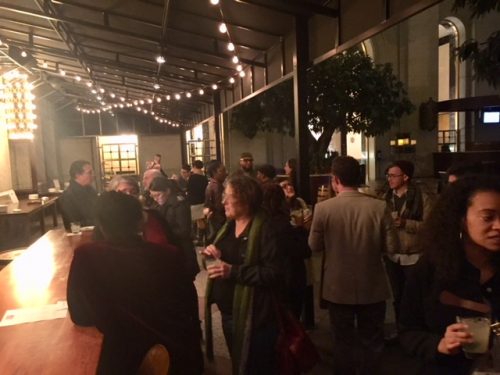This article is more than 5 years old.
Earlier this month I attended the American Studies Association Annual Meeting in Atlanta, GA. The ASA brings together scholars, teachers, and activists whose study of American culture is global, interdisciplinary, and social justice oriented. I enjoy being a member of the ASA, as it’s the perfect organization to support my research interests in American literature and women’s studies, as well as my digital humanities methodological approach. I’m also an elected member of the ASA’s Digital Humanities Caucus, so this year’s meeting was a busy one for me!
This year’s theme was States of Emergence, a call to think about what can productively emerge from our present state of (seemingly endless) local and global crises. To that end, I organized and moderated a panel, Critical Regionalisms and States of Emergence. The panel considered a critical regionalist perspective of American studies, one focused on “region” as not a fixed geographic boundary, but rather as a constant negotiation and construction of identity and belonging in American places. The panelists presented on range of topics from 19th-century periodical representations of Native Americans in the American West to present day debates over immigrant and refugee housing.
My panel took place on the first day, which freed me up to participate in all of the Digital Humanities Caucus events for the remainder of the conference. Here are some DH highlights.
American Quarterly panel on Digital Humanities special issue
The DH Caucus organized a panel to discuss the recent special issue of American Quarterly, Toward a Critically Engaged Digital Practice. Edited by DH Caucus members Lauren Tilton, Amy Earhart, Matt Delmont, Susan Garfinkel, Jesse P. Karlsberg, and Angel David Nieves, the issue included conversations, methodologies, and projects pertaining to American studies research, teaching, and engagement. Panelists spoke about their contributions to the special issue, both the written articles and the projects featured on the Beyond the Page interactive site. Other contributors in attendance were invited to speak about their articles, and I spoke briefly about the forum piece I co-authored, “Precarious Labor and the Digital Humanities.”
The special issue is the product of long-running discussions between the Digital Humanities Caucus and the American Quarterly Board of Managing Editors about the changing shape of digital scholarship and how American studies scholars’ digitally-inflected research can best be represented on the pages of a print journal. I am pleased to be a part of this innovative collaboration and look forward to seeing what new projects and discussions emerge from its publication.
The DH Caucus Reception
Every year the DH Caucus hosts a reception on the last night of the conference for all ASA attendees. ZSR graciously cosponsored the event this year, which was a great success! We had a high turnout, and many DH-interested folks came around to talk shop about digital scholarship, and to toast a productive conference. Thanks, ZSR, for your contribution!

What’s on deck for the coming year
During the DH Caucus business meeting, we began planning events for the coming year, as well as the panels that will be on next year’s ASA program. As the chair of the precarious labor subcommittee, I will be reaching out to scholars whose DH research does not fit neatly within traditional tenure and promotion rubrics and to faculty working on publicly-engaged community scholarship that often relies on digital platforms.
At the 2019 ASA meeting, the DH Caucus will continue its tradition of sponsoring digital project consultations for DH researchers, as well as showcasing DH works in progress on a Digital Shorts panel. We are also working on our guaranteed session topic, perhaps organizing it around the ethics of digitally preserving marginalized communities’ cultural heritage materials.
Stay tuned!

5 Comments on ‘Carrie at the American Studies Association Annual Meeting’
Great report! Congratulations on your election! Thanks for sharing.
Happy to hear that ASA was once again a fruitful conference. I will be eager to see what comes from next year’s program discussions about DH research and T&P.
I was unfamiliar with this ASA before you went – sounds like a wide-ranging event with lots of opportunities for learning and conversation. Very interested in what comes of the DH caucus precarious labor subcommittee! I happened upon ASA’s “Policy on Union Preference for ASA Conventions” so seems like an organization very in tune with labor issues.
I’m glad to hear that your reception was a success!
I’m glad that you were still able to participate in all the events despite the busy schedule. It looks like you all have a lot of great things coming up. Thanks for sharing Carrie!